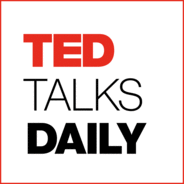As a humanist, Leo Igwe doesn't believe in divine intervention -- but he does believe in the power of human beings to alleviate suffering, cure disease, preserve the planet and turn situations of poverty into prosperity. In this bold talk, Igwe shares how humanism can free Africans from damaging superstitions and give them the power to rebuild the continent.For a chance to give your own TED Talk, fill out the Idea Search Application: ted.com/ideasearch.Interested in learning more about upcoming TED events? Follow these links:TEDNext: ted.com/futureyouTEDSports: ted.com/sportsTEDAI Vienna: ted.com/ai-viennaTEDAI San Francisco: ted.com/ai-sf Hosted on Acast. See acast.com/privacy for more information.

Bildung
TED Talks Daily Folgen
Want TED Talks on the go? Everyday, this feed brings you our latest talks in audio format. Hear thought-provoking ideas on every subject imaginable – from Artificial Intelligence to Zoology, and everything in between – given by the world's leading thinkers and doers. This collection of talks, given at TED and TEDx conferences around the globe, is also available in video format. Hosted on Acast. See acast.com/privacy for more information.
Folgen von TED Talks Daily
2467 Folgen
-
Folge vom 29.03.2018Why I choose humanism over faith | Leo Igwe
-
Folge vom 29.03.2018The role of faith and belief in modern Africa | Ndidi NwuneliNdidi Nwuneli has advice for Africans who believe in God -- and Africans who don't. To the religious, she advises against using God to outsource responsibility for what happens in their lives. To the non-religious, she asks that they keep an open mind and work with faith-based organizations, especially on issues like health care and education. "There's so much potential that can be realized when we walk across the divide of faith and, hand in hand, try to solve many of our problems," Nwuneli says.For a chance to give your own TED Talk, fill out the Idea Search Application: ted.com/ideasearch.Interested in learning more about upcoming TED events? Follow these links:TEDNext: ted.com/futureyouTEDSports: ted.com/sportsTEDAI Vienna: ted.com/ai-viennaTEDAI San Francisco: ted.com/ai-sf Hosted on Acast. See acast.com/privacy for more information.
-
Folge vom 28.03.2018Academic research is publicly funded -- why isn't it publicly available? | Erica StoneIn the US, your taxes fund academic research at public universities. Why then do you need to pay expensive, for-profit journals for the results of that research? Erica Stone advocates for a new, open-access relationship between the public and scholars, making the case that academics should publish in more accessible media. "A functioning democracy requires that the public be well-educated and well-informed," Stone says. "Instead of research happening behind paywalls and bureaucracy, wouldn't it be better if it was unfolding right in front of us?"For a chance to give your own TED Talk, fill out the Idea Search Application: ted.com/ideasearch.Interested in learning more about upcoming TED events? Follow these links:TEDNext: ted.com/futureyouTEDSports: ted.com/sportsTEDAI Vienna: ted.com/ai-viennaTEDAI San Francisco: ted.com/ai-sf Hosted on Acast. See acast.com/privacy for more information.
-
Folge vom 27.03.2018How fungi recognize (and infect) plants | Mennat El GhalidEach year, the world loses enough food to feed half a billion people to fungi, the most destructive pathogens of plants. Mycologist and TED fellow Mennat El Ghalid explains how a breakthrough in our understanding of the molecular signals fungi use to attack plants could disrupt this interaction -- and save our crops.For a chance to give your own TED Talk, fill out the Idea Search Application: ted.com/ideasearch.Interested in learning more about upcoming TED events? Follow these links:TEDNext: ted.com/futureyouTEDSports: ted.com/sportsTEDAI Vienna: ted.com/ai-viennaTEDAI San Francisco: ted.com/ai-sf Hosted on Acast. See acast.com/privacy for more information.
